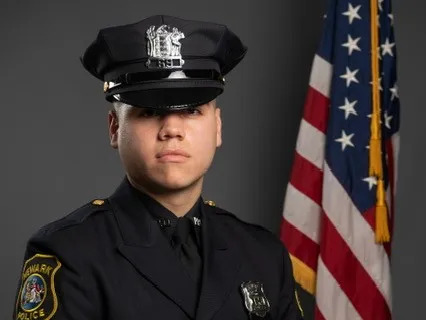NEWARK, NJ – A new debate is raging in New Jersey surrounding the murder of a Newark police officer at the hands of a 14-year-old boy.
On March 7, Newark, New Jersey, was rocked by tragedy when Detective Joseph Azcona, a 26-year-old five-year veteran of the police force, was gunned down in his patrol car while investigating illegal firearms.
The alleged shooter?
A 14-year-old boy, now charged with murder, attempted murder, and weapons offenses. A petition is circulating, demanding that this teenager be tried as an adult, reflecting a growing public outcry over the loss of a hero and a justice system some see as too lenient.
As the community mourns, fingers are pointing at Governor Phil Murphy’s juvenile justice reforms, with critics arguing they’ve created a revolving door for violent youth offenders. The question looms: Should this 14-year-old face the full weight of adult consequences?
The facts are chilling.
Azcona didn’t even have a chance to step out of his vehicle before the shots rang out. Another officer was wounded, and the suspect himself was injured in the exchange, though he survived. Four others were taken into custody, but it’s the 14-year-old at the center of this storm who has ignited a fierce debate. A petition gaining traction online insists that charging him as an adult is the only way to deliver justice for Azcona’s family and a city reeling from grief. Supporters argue that anyone capable of such a calculated, cold-blooded act—especially against a police officer—has crossed a line that age alone cannot excuse.
Critics of New Jersey’s juvenile justice system, reshaped under Governor Murphy, fuel this sentiment. Since taking office, Murphy has championed reforms aimed at rehabilitation over punishment, including a 2021 pilot program, “Restorative and Transformative Justice for Youths and Communities,” and policies favoring “curbside warnings” over detention for juvenile offenders.
The intent was noble: break the school-to-prison pipeline, address racial disparities, and give young people a second chance. But after a cop is killed by a 14-year-old allegedly armed with an illegal gun, many are asking—where’s the accountability?
Newark Mayor Ras Baraka captured the frustration: “We just have to do a better job… at making sure that our children are not handling guns in the street, shooting at police officers.” Yet some blame Murphy’s policies for sending a message that consequences are negotiable, even for the gravest crimes.
Under current New Jersey law, amended in 2015 under Governor Chris Christie, juveniles under 15 cannot be waived to adult court. This means the 14-year-old suspect will face a closed-door trial in juvenile court, shielded from public scrutiny, with a likely sentence capped at age 18 or 19 if convicted. To some, this feels like a slap on the wrist for taking a life—a life dedicated to protecting others. The New Jersey Fraternal Order of Police has called for a special review, arguing that justice isn’t being served. They’re not alone in believing that a murder this heinous demands an exception.
On the other side, advocates for juvenile justice reform argue that a 14-year-old’s brain isn’t fully developed, that rehabilitation should remain the priority. They point to studies showing that teens tried as adults are more likely to reoffend, trapped in a cycle of incarceration rather than redemption. Murphy’s defenders might say this tragedy isn’t proof his reforms failed but evidence of deeper societal issues—poverty, lack of opportunity, easy access to guns—that no law can fully fix. Charging this boy as an adult, they’d argue, risks throwing away a life that could still be salvaged.
Yet there’s a visceral counterpoint: Joseph Azcona’s life can’t be salvaged. His family, his fellow officers, and a grieving community don’t get a second chance. When a 14-year-old picks up a gun, aims it at a police officer, and pulls the trigger, it’s hard to see him solely as a child in need of saving. Intent matters, and this wasn’t a reckless accident—it was a deliberate act with irreversible consequences. The petition reflects a public tired of seeing violent acts met with what feels like leniency, especially when the victim wore a badge.
So, should he be charged as an adult? Yes—but with a caveat. The law should allow flexibility for extraordinary cases like this, where the crime’s severity and the public’s safety demand a stronger response. Murphy and state lawmakers should revisit the age cutoff for adult trials, not to abandon rehabilitation entirely, but to ensure justice aligns with the weight of the offense. A 14-year-old who murders a cop isn’t the same as one caught stealing a car. Pretending otherwise risks eroding trust in the system.
This isn’t about vengeance; it’s about balance. Azcona’s sacrifice deserves more than prayers and platitudes—it demands a reckoning. If Murphy’s reforms have left gaps that embolden violence, it’s time to fix them. A petition can’t bring back a fallen officer, but it can push us to ask: When does mercy undermine justice? For Newark, that line was crossed on March 7.

